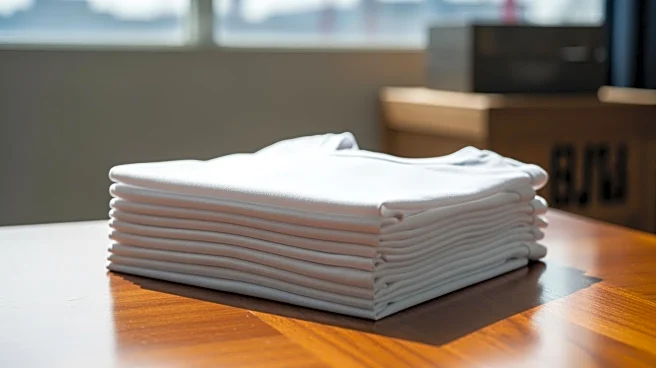What's Happening?
Bangladesh's apparel exports to the United States have seen a notable increase, reaching $*.*** billion in the January–July period of ****, up from $*.*** billion during the same period the previous year.
This growth highlights a rising trend in US sourcing from Bangladesh, despite ongoing global demand volatility. The share of T-shirts in Bangladesh's export basket has climbed significantly, reaching *.** percent in the January–July period of ****, compared to *.** percent a year earlier. This marks a steady structural shift in product demand, with T-shirts becoming increasingly important in Bangladesh's export portfolio. The value of exported T-shirts surged to $***.*** million in the first seven months of ****, up from $***.*** million in the same period of ****. T-shirts have moved from being the fifth most exported garment category in **** to the third position in the first seven months of ****, underscoring their growing strategic importance.
Why It's Important?
The increase in Bangladesh's T-shirt exports to the US is significant for several reasons. It reflects a shift in global sourcing patterns, with US buyers increasingly turning to Bangladesh for apparel needs. This trend could have implications for the US apparel industry, potentially affecting domestic manufacturers and retailers. The growth in exports also highlights Bangladesh's strengthening position in the global apparel market, which could lead to increased economic opportunities and job creation within the country. For US consumers, this may result in a wider variety of apparel options and potentially lower prices due to competitive sourcing. Additionally, the shift in export dynamics could influence trade policies and negotiations between the US and Bangladesh, impacting future economic relations.
What's Next?
As Bangladesh continues to expand its apparel exports to the US, stakeholders in both countries may need to consider the implications of this trend. US retailers and manufacturers might explore strategic partnerships or sourcing agreements with Bangladeshi suppliers to capitalize on competitive pricing and product availability. Policymakers in Bangladesh could focus on enhancing production capabilities and infrastructure to support further growth in exports. Additionally, trade negotiations between the US and Bangladesh may evolve to address the changing dynamics in apparel sourcing, potentially leading to new agreements or adjustments in tariffs and trade policies.
Beyond the Headlines
The growth in Bangladesh's T-shirt exports to the US may have broader implications for global apparel trade. It could signal a shift in manufacturing hubs, with Bangladesh emerging as a key player in the industry. This development might prompt other countries to reassess their positions in the global apparel market and explore ways to enhance competitiveness. Furthermore, the increased demand for Bangladeshi apparel could lead to discussions on labor practices and sustainability within the industry, as stakeholders seek to balance economic growth with ethical considerations.










